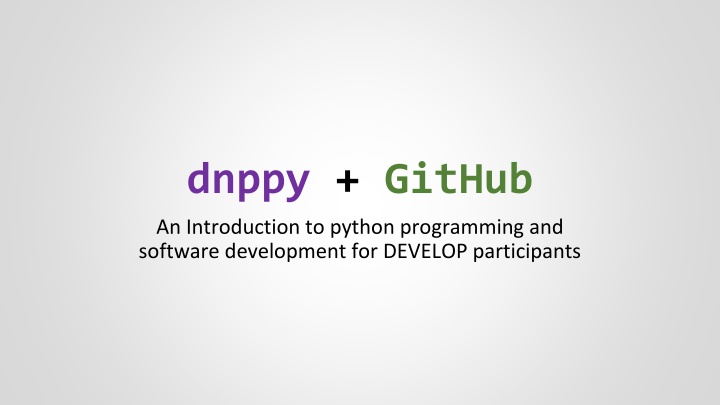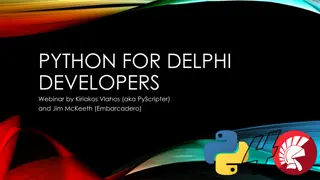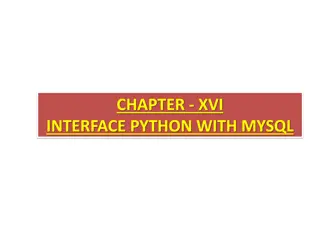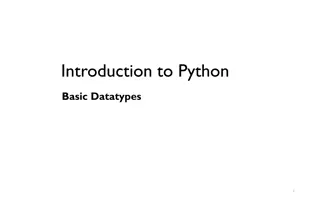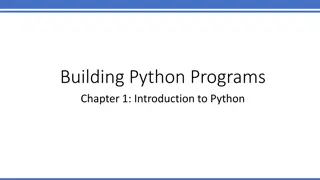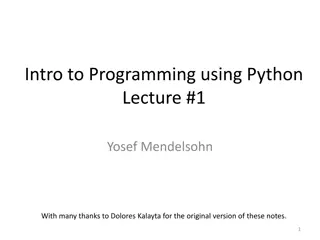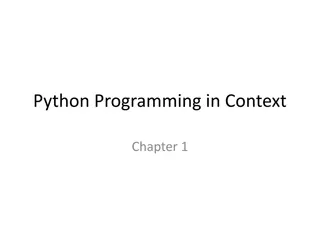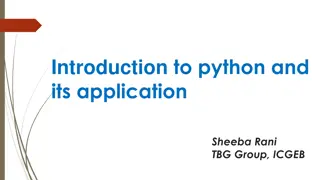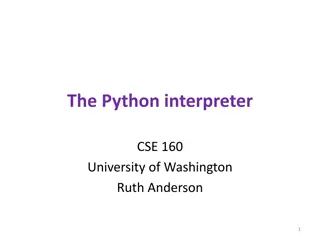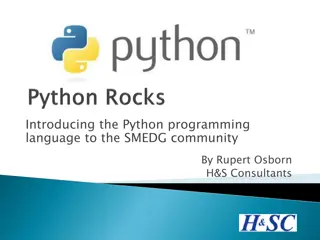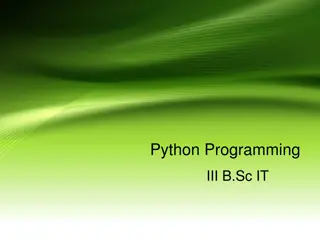Introduction to Python Programming and Software Development with dnppy
Developed as part of NASA's DEVELOP program, dnppy is a collection of standardized Python tools aimed at supporting capacity building in programming skills. Utilizing Git industry best practices, dnppy enhances institutional knowledge retention and empowers participants by providing accessible resources for code learning and collaboration. With its emphasis on open source software, dnppy expands the utility and accessibility of NASA data, aligning directly with NASA's science directorate goals. Easy to access and use, dnppy is managed through NASA's GitHub group, offering a robust toolkit for public contribution and use. Geared towards new programmers, dnppy features building block style functions and classes for scalability, making it an essential resource for anyone looking to delve into Python programming and software development.
Download Presentation

Please find below an Image/Link to download the presentation.
The content on the website is provided AS IS for your information and personal use only. It may not be sold, licensed, or shared on other websites without obtaining consent from the author.If you encounter any issues during the download, it is possible that the publisher has removed the file from their server.
You are allowed to download the files provided on this website for personal or commercial use, subject to the condition that they are used lawfully. All files are the property of their respective owners.
The content on the website is provided AS IS for your information and personal use only. It may not be sold, licensed, or shared on other websites without obtaining consent from the author.
E N D
Presentation Transcript
dnppy + GitHub An Introduction to python programming and software development for DEVELOP participants
Purpose Support DEVELOP s capacity building mission Basic programming skills are increasingly valuable Git is an industry best practice for software development Improve institutional knowledge retention Tools from past participants can be preserved and built upon Put more power in the hands of participants Softens the learning curve for people who want to learn code Open the DEVELOP toolkit for public contribution and use Open source software packages are almost self-marketing Increase the utility and accessibility of NASA data Directly supports NASA science directorate level goals
Strategy Use dnppy as a collection of standardized python tools Collection of building block style functions and classes for scalability Make python programming resources more accessible to new programmers You can access these resources from your future places of work or study Managed through NASA GitHub group for high visibility Can avoid excessive software release approval requests Put github into project workflows Much better collaborative code writing Much better configuration management Allows code contributions from the public Persistent access allows more fluid partner handoffs and updates
dnppy DEVELOP National Program python package
Info + Reference Collection of building block style functions and classes in python Has a DEVELOPedia page with additional info Maintained by class of Geoinformatics Fellows Started in December of 2014 Planned updates at the end of each term
Access Extremely easy to find A GitHub account is not required to download and use dnppy Admin rights are not required to install it
Wiki Walkthrough style navigation Covers some general python skill building topics Cataloged by module Primary discovery and learning resource for dnppy
Issues Help integrated into GitHub issue tracker For requesting help, new functionality, reporting bugs, etc Tightly integrated with code development Use the tag when submitting help issues help!
GitHub Collaborative software development
Info + Reference This specific use of GitHub is intended for teams with substantial software component to their projects final products, and some introductory level programming skills already on the team. Why should you use a version control system like Git? Detailed guide on DEVELOPedia on the dnppy page Several guides exist to help understand the concept of configuration management and version control systems like Git Consult this cheat sheet for Git shell commands
Setting up the team Each team member creates a GitHub profile Team lead forms a new organization From the dnppy page, fork a copy for your organization Download the GitHub Windows client on each team members PC and clone the organization copy of dnppy Teams can create separate branches within their fork if they wish, but it is not necessary.
Adding your project Add a project folder with the name Node-Year-ProjectID under \undeployed\proj_code\ in your local clone of dnppy
First commit After the first file has been added, the option to Commit will appear in your GitHub desktop client Fill out the commit fields, make the commit, then sync in the top right corner. Team members will then be able to sync to update their repositories!
Development Your team can continue to develop code in a full fledged Git environment, with all of its advantages Frequent commits with good descriptions are the key to smooth software development If you run into trouble, contact geoinformatics
End of term Create a pull request and your teams project changes will be merged into to the original dnppy repository on the NASA page Direct project partners to this master repository to access software products!
Tips Please use a dnppy fork to share project code with partners. Do not create new repositories for project handoff code. A new repository requires a new NASA Software Release Approval (SRA) request, which can take several months to complete. If you believe your project should not be bundled into dnppy, contact geoinformatics for help with SRA You are encouraged to create repositories on your personal GitHub account for personal learning exercises, but not project handoff software Never ever put large datasets, especially raster data, in your git repository. Making a commit with excessively large files will irreversibly bloat your repository to unwieldy sizes. Git is intended for use with text data like code.
